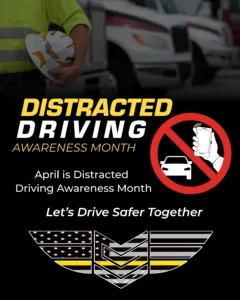 April is Distracted Driving Awareness Month, a crucial time to reflect on the dangers of distractions behind the wheel. Every year, countless lives are affected by preventable accidents caused by distracted driving, and the towing industry is significantly impacted. In this article, we will explore how distracted driving affects the towing industry and emphasize the importance of promoting safe driving practices. Together, we can reduce these incidents and foster a safer driving environment.
April is Distracted Driving Awareness Month, a crucial time to reflect on the dangers of distractions behind the wheel. Every year, countless lives are affected by preventable accidents caused by distracted driving, and the towing industry is significantly impacted. In this article, we will explore how distracted driving affects the towing industry and emphasize the importance of promoting safe driving practices. Together, we can reduce these incidents and foster a safer driving environment.
Understanding Distracted Driving
Distracted driving involves any activity that diverts attention from driving, such as talking or texting on a phone, eating and drinking, conversing with passengers, or adjusting the stereo. It can be categorized into three main types:
- Visual distractions, which take your eyes off the road.
- Manual distractions, which involve taking your hands off the wheel.
- Cognitive distractions, which divert your mind from driving.
The impact of distracted driving is significant, with alarming statistics highlighting its dangers. According to the National Highway Traffic Safety Administration (NHTSA), distracted driving claimed 3,522 lives in 2021 alone. Additionally, approximately 400,000 individuals are injured annually due to accidents caused by distracted driving. These figures emphasize the urgent need for awareness and prevention, particularly for industries like towing that operate in high-traffic situations.
Common distractions faced by drivers include texting, using in-car technology, adjusting the radio, interacting with passengers, and eating. Texting while driving is particularly hazardous as it involves all three types of distractions. For the towing industry, these distractions significantly elevate safety risks when tow truck operators are responding to motorists on the side of the road or at an accident scene. This makes it essential to promote safe driving practices, especially during Distracted Driving Awareness Month.
Effects of Distracted Driving on the Towing Industry
Distracted driving poses a substantial threat to the towing industry, leading to increased accident rates involving tow trucks. As more drivers engage with their smartphones and other distractions, the risk of collisions rises sharply. Tow trucks, often stationed on the side of the road assisting stranded motorists, are particularly vulnerable to being struck by distracted drivers. This not only endangers tow truck operators but also puts other motorists and passengers at risk.
Since 2020, approximately 487 roadside workers, including tow truck operators, construction workers, and law enforcement officers, have been struck and killed by vehicles. The top two situations where first responders have been hit and killed include responding to disabled vehicles and responding to crash scenes. These figures highlight the grave dangers faced by those working on or near roadways.
Responding tow truck operators
face heightened dangers when other motorists are inattentive. When a tow truck is on the scene of an accident or vehicle breakdown, operators work in close proximity to moving traffic. Distracted drivers may fail to notice flashing lights and warning signs, leading to tragic events. This situation necessitates heightened vigilance from tow truck operators to protect themselves and those they assist.
All 50 states have enacted “Move Over” laws, which require drivers to slow down and, when possible, change lanes when approaching an emergency vehicle on the roadside. Despite these laws, distracted driving continues to be a significant risk factor. States with the highest number of worker deaths from vehicle strikes include Texas, California, Florida, and Georgia. Increased awareness and compliance with Move Over laws can help protect those who work tirelessly to keep our roadways safe.
Additionally, laws regarding cell phone usage while driving have been implemented to curb distracted driving. As of 2023, a ban on driving while talking on a handheld cellphone was in place in 25 states, the District of Columbia, Puerto Rico, Guam, the U.S. Virgin Islands, and the Northern Mariana Islands. These bans are all under primary enforcement, meaning an officer may cite a driver for using a handheld cellphone without any other traffic offense taking place. Furthermore, 48 states, along with the District of Columbia, Puerto Rico, Guam, the U.S. Virgin Islands, and the Northern Mariana Islands, have banned text messaging for all drivers. These regulations highlight the widespread effort to prevent distracted driving and protect motorists, including tow truck operators who face high risks on the road.
As we observe Distracted Driving Awareness Month, it’s crucial to recognize the profound impact of these behaviors on the towing industry. By raising awareness about the dangers of distracted driving, we can create safer roadways for everyone, including those providing essential towing services.
Promoting Safe Driving Practices
Preventing distracted driving starts with personal responsibility and awareness. Drivers can take proactive steps to ensure their full attention remains on the road. Some key preventive measures include:
- Putting phones on silent or using “Do Not Disturb” mode while driving.
- Setting GPS and adjusting music before starting the vehicle.
- Avoiding eating or drinking while driving.
- Encouraging passengers to assist with navigation and other in-car tasks.
- Pulling over safely if it is necessary to take a call or send a message.
Additionally, spreading awareness about the dangers of distracted driving is essential. Educating friends, family, and colleagues about the risks and consequences can help reduce these incidents. Tow truck operators put their lives on the line daily to assist motorists, and distracted driving significantly increases their risk of injury or death. By making conscious efforts to drive attentively and encouraging others to do the same, we can protect those who work on our roadways and help prevent unnecessary tragedies. Let’s all do our part to keep our roads safe and support the professionals who dedicate their lives to roadside assistance.